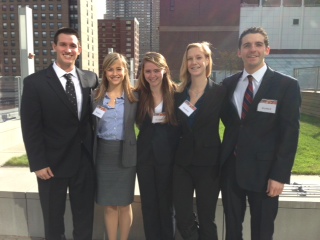Student economists had the chance to take their understanding of the U.S. economy and make a recommendation for the Federal Reserve at the College Fed Challenge on November 5.

L to R: Michael Mangravite ’14, Sara DiMassimo ’14, Erin Fett ’14, Lydia Mesler ’15, and Zach Pitkowsky ’15
Taking on 36 other universities, for the first time, Colgate’s economics department participated in the national competition hosted and judged by the Federal Reserve Bank of New York.
The students applied curricular and practical knowledge from their ECON 353 class titled Fed Challenge, taught by Professor Nicole Simpson. They researched U.S. macroeconomic data as well as analyzed historical and international macroeconomic episodes and policy responses.
In October, the class traveled to New York City to participate in an orientation and meet with Chris Burke ’89, vice president and director of Domestic Money Markets and Reserve Management at the New York Fed. Over lunch, Burke gave the students advice and told them the inside scoop on what it’s like to be in Federal Open Market Committee meetings with Chairman Ben Bernanke.
Then, in November, five students — all junior and senior economics majors — gave their presentation summarizing the current state of the U.S. macro economy, including its weaknesses and threats, and made a monetary policy recommendation for the Fed.
“It was great to focus on a topic and be questioned about it in front of true experts,” said Zachary Pitkowsky ’15.
The team received tremendous support from the entire economics department faculty and seven different economics classes, who viewed their presentations in advance and provided constructive feedback.
In addition, J.S. Hope ’97, Colgate’s director of investments, and Ellie Schmidt ’12, an investment analyst who also works in Colgate’s finance and administration office, previewed the presentation and asked the team questions.
“This ‘roadshow’ made [the team] far better presenters and responders to probing questions,” said Pitowsky.
Ultimately, the team did not advance to the semi-finals, but “win or lose, their enthusiasm has created a fun buzz around the department among our students, faculty, and alums,” said Simpson. “I am very proud of them, and deeply appreciate the hard work they did and how much we all learned in the process.”